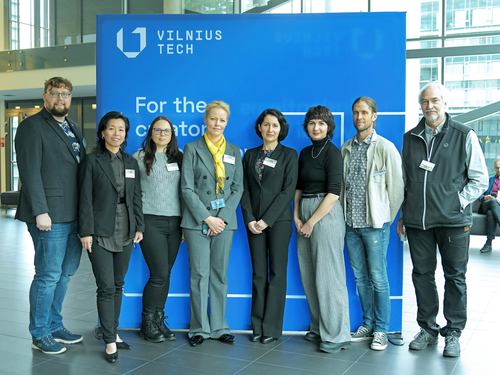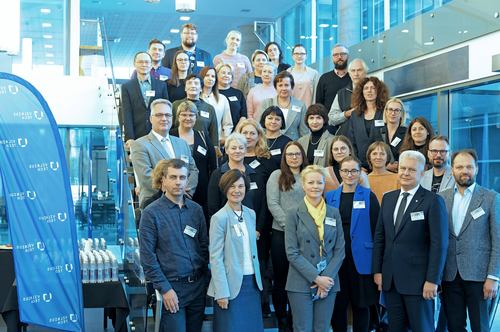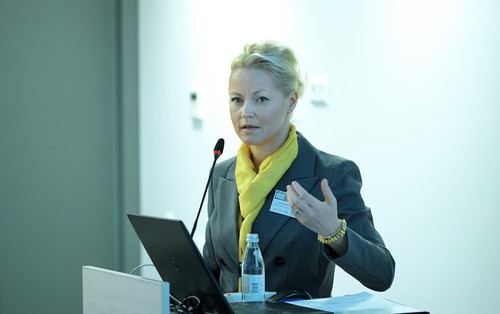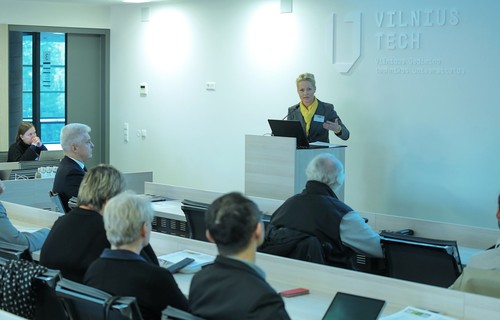Home
For international students
VILNIUS TECH Invites to Create a Cleaner Environment: Lessons from Foreign Partners
- Programmes in English 2025/2026
- Admission 2025/2026 Scholarships
- For exchange students
- Free Movers
- Transfer studies
- Erasmus+ studies and traineeships
- Mentor programme
- Student testimonials
- Accommodation
- Career Services
- Medical Care
- Immigration Regulations
- Leisure and Student Activities
- Useful information
- VILNIUS TECH for Creators of Tomorrow
- Mental and spiritual support
- Representatives Abroad
- Contacts
- Computer Engineering
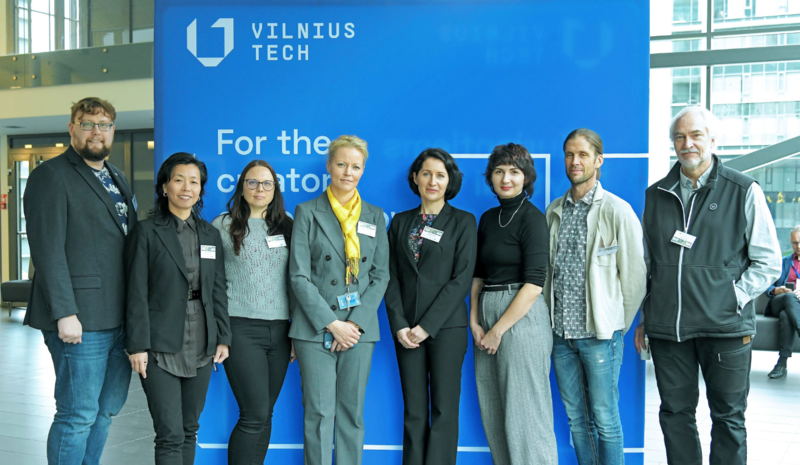.png)
2023-12-07
VILNIUS TECH Invites to Create a Cleaner Environment: Lessons from Foreign Partners
As public concern for the environment grows, there is still, however, little discussion about the pollution caused by perfluoroalkyl and polyfluoroalkyl substances (PFAS). At the "Zero PFAS. Vilnius Roadshow" conference held at Vilnius Gediminas Technical University (VILNIUS TECH) in October, scientists from Lithuania, Sweden, Germany, Latvia, and Finland were among the first to share their latest research results.
We spoke with the organizer of the conference, Prof. Dr. Edita Baltrėnaite-Gediene, the Head of the Environmental Protection Institute at the Faculty of Environmental Engineering (AIF) at VILNIUS TECH, about what PFAS is and the impact these substances have on nature and humans.
"Eternal pollutants" in our food chain
According to Prof. Dr. E. Baltrėnaite-Gediene, PFAS is a group of several thousand synthetic chemical substances widely used in society and found in the environment. They are resistant to decomposition and easily accumulate in living organisms, which is why they are also known as "eternal pollutants."
"PFAS is found in drinking water, agricultural products, and thus becomes part of our food chain. After being used in food packaging, clothing, the automotive and computer manufacturing industries, PFAS enters the streams of technogenic waste, which later reaches the environment and our food chain," explains the scientist.
When ingested with food, PFAS over time can cause immune system and kidney disorders as well as disrupt normal development.
"Unfortunately, there are already more than 17,000 known areas in Europe contaminated with PFAS, and an additional 21,000 places where PFAS pollution is suspected," says Professor Dr. E. Baltrėnaite-Gediene.
Lack of research and infrastructure
Although the pollution from these substances poses a threat to both human and animal health as well as the environment, comprehensive studies on soil, drinking water, wastewater, and human health in Lithuania are still short. According to the VILNIUS TECH researcher, this requires collaboration between various environmental and public health science fields, which is what this conference successfully initiated.
"For this, a PFAS management strategy must be developed, and public health monitoring must be implemented," explains Prof. Dr. E. Baltrėnaite-Gediene.
We can learn good practices from VILNIUS TECH's Swedish partners as well, who were one of the speakers at the conference.
"The Swedish conduct constant, long-term studies of soil, airport environments, drinking water, wastewater, human health, and landfill filtrate," says the scientist.
Nevertheless, there is a lack of necessary research infrastructure and equipment in Lithuania.
"Each pollutant or group of pollutants requires special equipment, methodology, trained personnel, and, of course, funding, but first and foremost, the realisation of its significance and urgency. With more data, we can educate the public, help government institutions make data-driven decisions. The main benefit of this conference is that we can now see an interest from Lithuanian ministries and water treatment companies, which is already an excellent foundation for further collaboration," says Prof. Dr. E. Baltrėnaite-Gediene.
The text was prepared by Milda Mockūnaitė-Vitkienė, Head of Internal Communication Projects at the Public Communication Directorate of VILNIUS TECH.
Photos by Aleksas Jaunius.
We spoke with the organizer of the conference, Prof. Dr. Edita Baltrėnaite-Gediene, the Head of the Environmental Protection Institute at the Faculty of Environmental Engineering (AIF) at VILNIUS TECH, about what PFAS is and the impact these substances have on nature and humans.
"Eternal pollutants" in our food chain
According to Prof. Dr. E. Baltrėnaite-Gediene, PFAS is a group of several thousand synthetic chemical substances widely used in society and found in the environment. They are resistant to decomposition and easily accumulate in living organisms, which is why they are also known as "eternal pollutants."
"PFAS is found in drinking water, agricultural products, and thus becomes part of our food chain. After being used in food packaging, clothing, the automotive and computer manufacturing industries, PFAS enters the streams of technogenic waste, which later reaches the environment and our food chain," explains the scientist.
When ingested with food, PFAS over time can cause immune system and kidney disorders as well as disrupt normal development.
"Unfortunately, there are already more than 17,000 known areas in Europe contaminated with PFAS, and an additional 21,000 places where PFAS pollution is suspected," says Professor Dr. E. Baltrėnaite-Gediene.
Lack of research and infrastructure
Although the pollution from these substances poses a threat to both human and animal health as well as the environment, comprehensive studies on soil, drinking water, wastewater, and human health in Lithuania are still short. According to the VILNIUS TECH researcher, this requires collaboration between various environmental and public health science fields, which is what this conference successfully initiated.
"For this, a PFAS management strategy must be developed, and public health monitoring must be implemented," explains Prof. Dr. E. Baltrėnaite-Gediene.
We can learn good practices from VILNIUS TECH's Swedish partners as well, who were one of the speakers at the conference.
"The Swedish conduct constant, long-term studies of soil, airport environments, drinking water, wastewater, human health, and landfill filtrate," says the scientist.
Nevertheless, there is a lack of necessary research infrastructure and equipment in Lithuania.
"Each pollutant or group of pollutants requires special equipment, methodology, trained personnel, and, of course, funding, but first and foremost, the realisation of its significance and urgency. With more data, we can educate the public, help government institutions make data-driven decisions. The main benefit of this conference is that we can now see an interest from Lithuanian ministries and water treatment companies, which is already an excellent foundation for further collaboration," says Prof. Dr. E. Baltrėnaite-Gediene.
The text was prepared by Milda Mockūnaitė-Vitkienė, Head of Internal Communication Projects at the Public Communication Directorate of VILNIUS TECH.
Photos by Aleksas Jaunius.












